| School | Level | Program | Admissions |
|---|---|---|---|
| Ohio University | Master | MSN Psychiatric Mental Health Nurse Practitioner | Website |
| Sacred Heart University | Master | RN to BSN to MSN - Psychiatric Mental Health Nurse Practitioner | Website |
| Seton Hall University | Master | MSN: Psychiatric Nurse Practitioner | Website |
| Georgetown University | Master | Online Master's in Nursing | Website |
| George Mason University | Master | MSN - Family Nurse Practitioner | Website |
| Sacred Heart University | Master | RN to BSN to Master of Science in Nursing | Website |
| Campbellsville University | Bachelor | RN to BSN | Website |
| Campbellsville University | Master | Online MSN with FNP Track | Website |
| Sacred Heart University | Bachelor | RN-BSN - RN to Bachelor of Science in Nursing | Website |
View more online featured programs:
For nurses, the first few years after graduation are a good time to try several different specialties, until they find the area of nursing they love. With such a mind-boggling array of specialties available, it can be difficult to make a decision.
You already have some experience from your clinicals during school but, now, you will be assigned more patients and ultimately have autonomy. Most new nurses will be assigned to a mentor to learn the ropes of the job.
We have created a list of the most popular types of nursing specialties, including the type of work each entails, granting new nursing students and graduates a closer look into the diverse field of nursing care.
Deciding which nursing career best suits you can be a challenge.
Some nurses are born knowing what they want to do, but most of us need a little time to explore. All nursing jobs can feel awkward and unpleasant at first: not knowing your way around, practicing new skills, or not knowing where things are kept, can be tough, but a good rule of thumb is that you won’t feel entirely at ease in your new environment until about six months at the job. If, after that, you find the specialty is not at all what you want to work in, consider heading in a different direction and trying another field. You will find your comfort zone with some time and experimentation, ultimately leading you to a rich, challenging, and rewarding career in nursing.
| School | Level | Program | Admissions |
|---|---|---|---|
| Sacred Heart University | Master | RN to BSN to Master of Science in Nursing | Website |
| Campbellsville University | Bachelor | RN to BSN | Website |
| Campbellsville University | Master | Online MSN with FNP Track | Website |
| Sacred Heart University | Bachelor | RN-BSN - RN to Bachelor of Science in Nursing | Website |
| Sacred Heart University | Master | MSN - Clinical Nurse Leader | Website |
| Sacred Heart University | Master | MSN - Family Nurse Practitioner | Website |
| Sacred Heart University | Master | MSN - Nursing Education | Website |
| Sacred Heart University | Master | RN-BSN-MSN - Clinical Nursing Leader | Website |
| Sacred Heart University | Master | RN-BSN-MSN - Nursing Education | Website |
View more online featured programs:

Medical/Surgical (Medsurg) Nursing
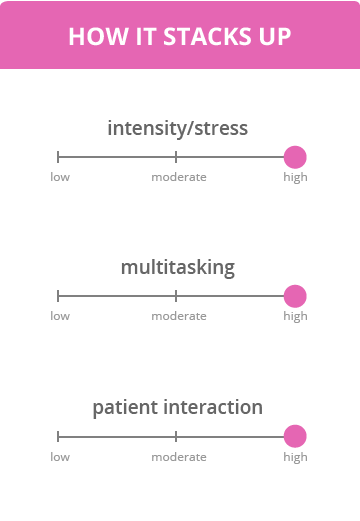 Medical Surgical Nursing is a great place for new graduates to start out. Working on a general floor in a hospital grants many opportunities to try out a wide variety of nursing skills. In this role, you will be preparing patients for surgery, and caring for them post-surgically.
Medical Surgical Nursing is a great place for new graduates to start out. Working on a general floor in a hospital grants many opportunities to try out a wide variety of nursing skills. In this role, you will be preparing patients for surgery, and caring for them post-surgically.
Every day will be filled with patients suffering from every disease under the sun. A MedSurg nurse becomes excellent at starting and maintaining IVs, inserting catheters, wound care, medication administration, physical assessments, communicating with physicians and patient families, and even giving a patient comfort before death. From brown recluse spider bites to seizures, you will see it all, and gain great experience that you can transfer to any other specialty.
Stress Level: High. In today’s world, many hospitals give Medical/Surgical nurses a heavy patient load. New grads are learning a lot and beginning to use their skills and knowledge in the field, which can be nerve-wracking when you are just starting out. In this specialty, things can turn on a dime, and in a split second, your patient’s status can change. Patients and family can be worried and stressed, and may blow up at you out of frustration and fear.
Multitasking Required: High. A Medsurg nurse has morning, noon, and evening medications to pass, and performs regular blood glucose checks. Patients will constantly turn on their call lights at all hours. A lot of time is spent paging physicians and waiting for them to call back. Surgeries will be scheduled each day for which you will prepare your patients. Some patients will call you many times, and the list of patients you need to go see will get longer and longer as you attempt to fulfill all of your obligations. You will also constantly be triaging, and of course, charting.
Patient Interaction: High. Frequent contact is maintained with patients and their families. They will see you during their daily assessments, medication passes, and treatments. You may find that patients typically don’t feel very well and will require you to help them, or call with questions or requests.
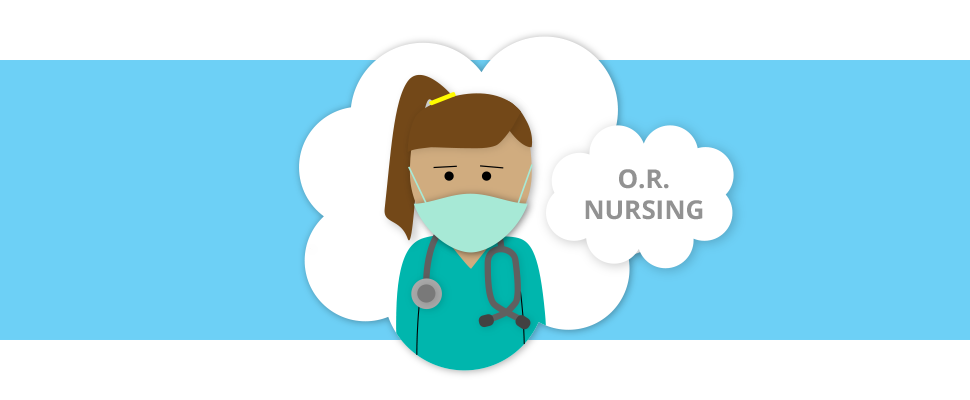
O.R. Nursing
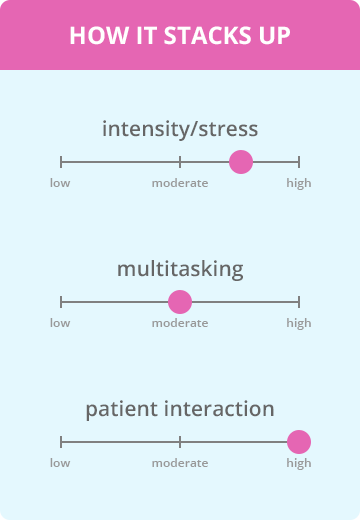 Operating room nurses work side by side with surgeons and anesthesiologists in the operating room. This job could be in a hospital or an ambulatory surgery center, with a background in emergency room care and critical care nursing preferred. The field of surgery is constantly changing as new advances in medicine are discovered, so the O.R. nurse will be called upon frequently to expand her horizons as new technology is introduced. Due to the increased pressure in this position, O.R. nurses are called upon to be level-headed and have excellent decision-making skills, even in the most stressful of situations. Duties may include patient assessment, creating and maintaining a sterile field, passing sterile instruments and other items that may be needed during the surgery, assisting the surgical team and maintaining a safe environment. Those with more extensive training assist the surgeon in controlling bleeding and suturing.
Operating room nurses work side by side with surgeons and anesthesiologists in the operating room. This job could be in a hospital or an ambulatory surgery center, with a background in emergency room care and critical care nursing preferred. The field of surgery is constantly changing as new advances in medicine are discovered, so the O.R. nurse will be called upon frequently to expand her horizons as new technology is introduced. Due to the increased pressure in this position, O.R. nurses are called upon to be level-headed and have excellent decision-making skills, even in the most stressful of situations. Duties may include patient assessment, creating and maintaining a sterile field, passing sterile instruments and other items that may be needed during the surgery, assisting the surgical team and maintaining a safe environment. Those with more extensive training assist the surgeon in controlling bleeding and suturing.
Stress Level: High. In the operating room, emergencies can pop up without a moment’s notice. O.R. nurses must be able to keep their composure and continue to think critically, as every second counts. These nurses spend significant time on their feet when assisting with surgical procedures, which can be taxing.
Multitasking Required: Moderate. Since O.R. nurses are working with one patient at a time in surgery, there is less demand to be in three different places at once. However, within the surgical suite there may be multiple tasks for which the nurse is responsible, such as continuously monitoring vital signs, maintaining IVs, and ensuring that the sterile field is not compromised.
Patient Interaction: None – moderate. If your job description has you following the patient from the preoperative all the way through to the post-operative stages, you will be communicating with and supporting the patient and possibly their family. If you are working in the surgical suite exclusively, there will be no nurse to patient interaction.
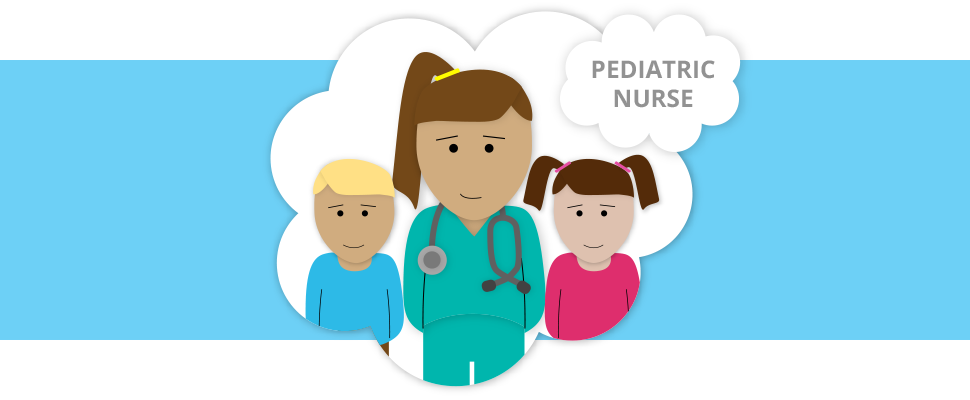
Pediatric Nurse
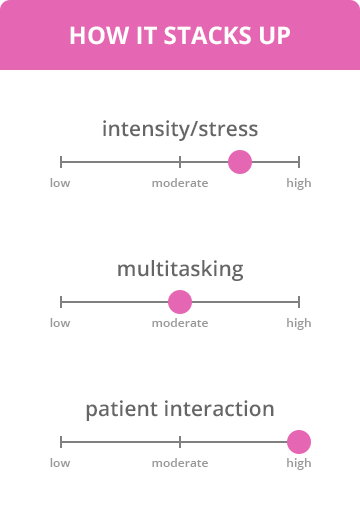 First and foremost, the Pediatric Nurse must enjoy working with children and should be adept at working with families, as the child will always be accompanied by a relative. In a clinic setting, you will meet patients of all ages, from newborns to college students. The Pediatric Nurse interviews and performs assessments for annual physicals, administers vaccines, applies splints and braces, administers breathing treatments via nebulizer, gives medications, dresses wounds, and draws blood. In some settings, you may also be working on the phones giving advice to parents. Don’t let the fun, friendly setting fool you, however; this is a place where anything can, and frequently does, happen.
First and foremost, the Pediatric Nurse must enjoy working with children and should be adept at working with families, as the child will always be accompanied by a relative. In a clinic setting, you will meet patients of all ages, from newborns to college students. The Pediatric Nurse interviews and performs assessments for annual physicals, administers vaccines, applies splints and braces, administers breathing treatments via nebulizer, gives medications, dresses wounds, and draws blood. In some settings, you may also be working on the phones giving advice to parents. Don’t let the fun, friendly setting fool you, however; this is a place where anything can, and frequently does, happen.
Be sure to familiarize yourself with the crash cart, as a child’s status can change much more quickly than an adult’s. Some children will thrash around and kick to avoid getting shots. Others have behavioral problems that can make the visit a challenge for both themselves and the nurse. A hefty dose of patience, compassion, and a good sense of humor are vital for a pediatric nurse.
Stress Level: Moderate to high. The number of patients to care for can vary. Some days can flow without a hitch and some may be very chaotic. Children are often afraid to go to the doctor, and can become uncooperative. This can make time management a challenge. Also, families may be stressed about their sick child and will need the nurse to offer them support.
Multitasking Required: Moderate. As a pediatric nurse, you will have to make sure your young patients are well at ease, as well as assuaging the worries of protective parents. Your day will consist of seeing many patients, and it is important to be able to keep track of your schedule.
Patient Interaction: High. A pediatric nurse sees her patients from the moment they are checked in to the education at the end of each visit. Family interaction is also an essential component of pediatric nursing.
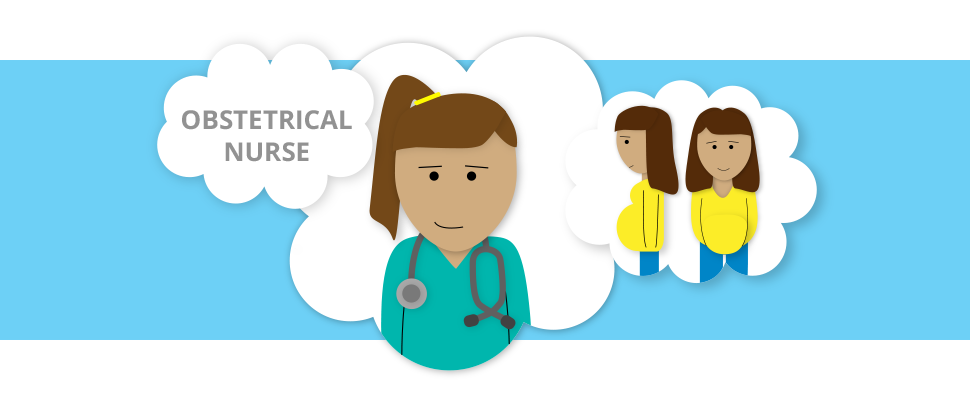
Obstetrical Nurse
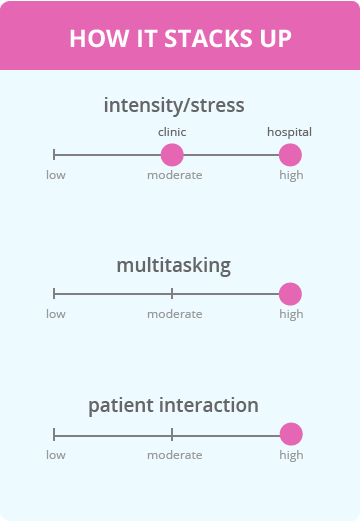 An Obstetrical Nurse works with patients trying to achieve pregnancy and provides prenatal care, as well as care during labor, delivery, and for postpartum mothers and their babies. The Obstetrical Nurse will perform patient assessments, provide patient education, and monitor both the mother and the baby during labor. The nurse will assist during the delivery, prepare mothers for surgery when needed, and provide postpartum care and education. For parents, pregnancy and childbirth is exhilarating, but also a time fraught with stress. The Obstetrical Nurse is crucial to his or her patients. Whether parents are having their first child or their fifth, they will need support, education and a strong patient advocate.
An Obstetrical Nurse works with patients trying to achieve pregnancy and provides prenatal care, as well as care during labor, delivery, and for postpartum mothers and their babies. The Obstetrical Nurse will perform patient assessments, provide patient education, and monitor both the mother and the baby during labor. The nurse will assist during the delivery, prepare mothers for surgery when needed, and provide postpartum care and education. For parents, pregnancy and childbirth is exhilarating, but also a time fraught with stress. The Obstetrical Nurse is crucial to his or her patients. Whether parents are having their first child or their fifth, they will need support, education and a strong patient advocate.
Stress Level: Clinic setting – Moderate. Hospital setting – High. During labor and delivery, you will be on your toes, assisting and monitoring the mother, then caring for both the newborn and the mother postpartum. Complications of labor can and do occur, and the condition of the newborn can change rapidly, leading to some very tense and stressful moments.
Multitasking Required: High. The Obstetrical Nurse continuously monitors both mother and baby. He or she communicates with and assists physicians, maintains IVs and administers medications, maintains communication with families, supports and coaches the mother, and provides care postpartum for Mom and baby. Assessments must be done frequently until patients are stable.
Patient Interaction: High. The majority of time is spent at the bedside with your patients. Obstetrical Nurses must be calm, patient, and able to establish an excellent rapport.
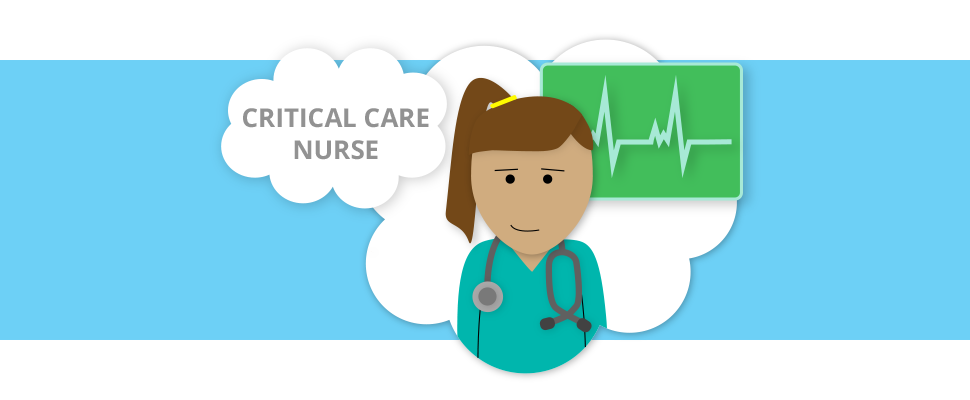
Critical Care Nursing
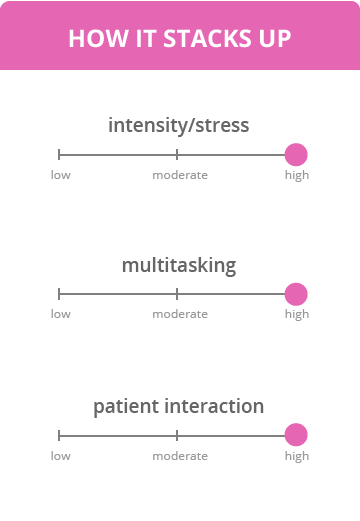 Critical Care Nursing patients are in particular need of careful, close monitoring and frequent care. This type of nursing is more intense and more focused. Each patient will need more attention and care, so the nurse-to-patient ratio is typically smaller. You will see patients with a variety of critical illness. Patient rooms will be more crowded with instruments that you will be responsible for reading and maintaining, such as cardiac monitors, pulmonary artery catheters, pulse oximeters, and ventilators. A new nurse can practice many skills in the CCU, such as suctioning, resuscitation, feeding tube maintenance, and central line care, and will be called upon to handle situations where the patient’s grasp on life is tenuous. Fortunately, many nurses in the CCU tend to stick together and help each other whenever they can.
Critical Care Nursing patients are in particular need of careful, close monitoring and frequent care. This type of nursing is more intense and more focused. Each patient will need more attention and care, so the nurse-to-patient ratio is typically smaller. You will see patients with a variety of critical illness. Patient rooms will be more crowded with instruments that you will be responsible for reading and maintaining, such as cardiac monitors, pulmonary artery catheters, pulse oximeters, and ventilators. A new nurse can practice many skills in the CCU, such as suctioning, resuscitation, feeding tube maintenance, and central line care, and will be called upon to handle situations where the patient’s grasp on life is tenuous. Fortunately, many nurses in the CCU tend to stick together and help each other whenever they can.
Stress Level: High. Don’t let the lower patient load fool you – a nurse will be on her toes constantly caring for these high-acuity patients and the status of a patient can deteriorate rapidly. A CCU nurse has an individual responsibility to keep her patients carefully monitored, and things can get dicey when more than one patient needs assistance at the same time.
Multitasking Required: High. Critical care patients will need very frequent assessments and complex treatments, and their medications can change often based on their fluctuating status. You will often interact with physicians and members of Respiratory Therapy.
Patient Interaction: High. The CCU nurse spends a lot of time with each patient, depending on the extent of their illness. CCU nurses also tend to do more primary care for their patients, such as bathing and linen changes.
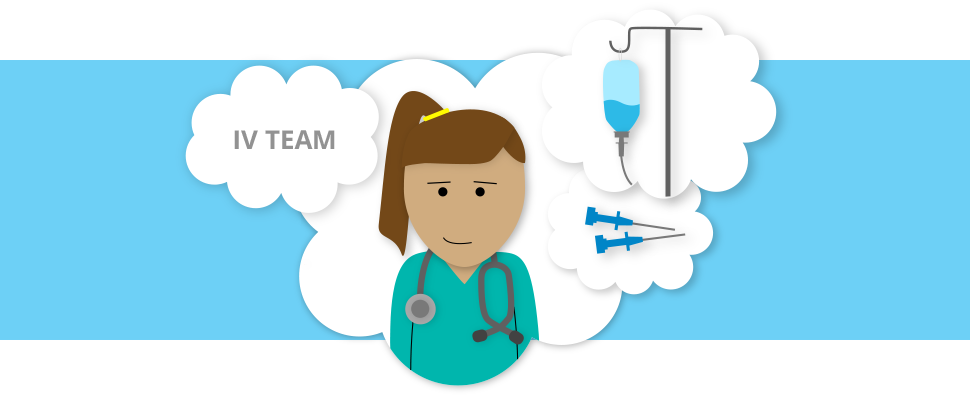
IV Team
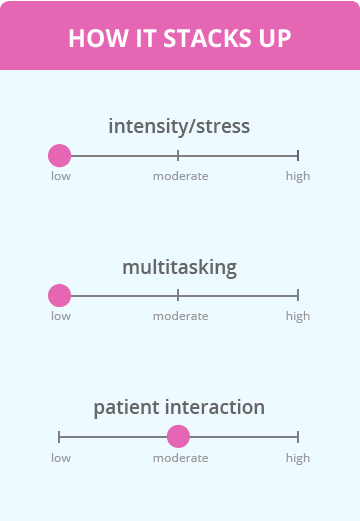 If you are one of those nurses with a flair for finding a suitable vein, you might consider working as an IV team member. Duties include placement and maintenance of Peripherally Inserted Central Catheters (PICC lines), IV insertion, and dressing changes. They also assist when problems arise from using PICC lines, such as correcting a blocked or damaged line. These nurses work with patients of all ages to familiarize them with the devices they will use by demonstrating what they look like and how they work.
If you are one of those nurses with a flair for finding a suitable vein, you might consider working as an IV team member. Duties include placement and maintenance of Peripherally Inserted Central Catheters (PICC lines), IV insertion, and dressing changes. They also assist when problems arise from using PICC lines, such as correcting a blocked or damaged line. These nurses work with patients of all ages to familiarize them with the devices they will use by demonstrating what they look like and how they work.
Stress Level: Low. Nurses on the IV team usually have no set schedule, but cover the needs of multiple areas as they arise. There may be some downtime, or you may be called to several places at once.
Multitasking Involved: Low. The IV nurse is responsible for a more focused range of tasks, allowing for less multitasking.
Patient Interaction: Moderate. While you may return to your patient’s room from time to time for maintenance, you will spend only brief periods of time with each patient.
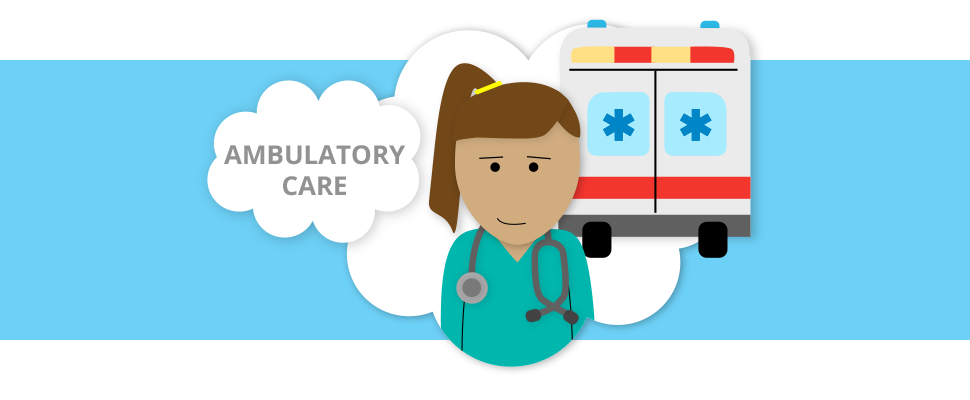
Ambulatory Care
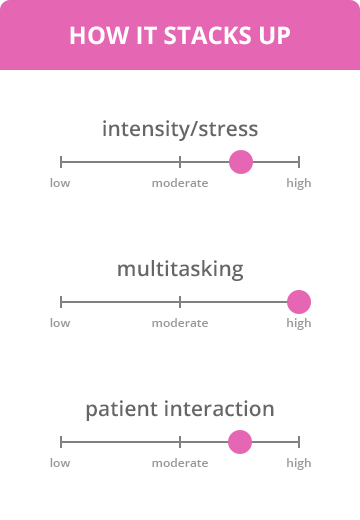 Ambulatory Care is for patients who need to be seen on an outpatient basis. It encompasses a wide variety of settings, such as clinics, surgical and diagnostic centers, community facilities, and school or college clinics. In this field, you can work with patients of all ages. The Ambulatory Care Nurse must be able to utilize critical thinking, have a wide range of excellent nursing skills, good assessment skills and be comfortable giving patient education. These facilities offer desirable hours, a nine to five workday, weekends and holidays off, although recently these institutions have turned to extended hours and partial weekends.
Ambulatory Care is for patients who need to be seen on an outpatient basis. It encompasses a wide variety of settings, such as clinics, surgical and diagnostic centers, community facilities, and school or college clinics. In this field, you can work with patients of all ages. The Ambulatory Care Nurse must be able to utilize critical thinking, have a wide range of excellent nursing skills, good assessment skills and be comfortable giving patient education. These facilities offer desirable hours, a nine to five workday, weekends and holidays off, although recently these institutions have turned to extended hours and partial weekends.
Stress Level: Moderate to High. Patients may turn up with multiple complaints, some in distress. The patient-to-nurse ratio can be high, with multiple patients needing care at the same time.
Multitasking Involved: High. Nurses in an Ambulatory Care will be called upon to use a diverse skill set. Injections, medication administration, X-RAY, wound care and assessments from head-to-toe physicals to depression screens can all be part of the average workday. This is an excellent setting to become very skilled at a broad range of procedures because the nurse will be responsible for administering them frequently.
Patient Interaction: Moderate. While you may see each patient briefly, usually you will see many patients in one day. Many patients return for ongoing care and form a relationship with their nurse.
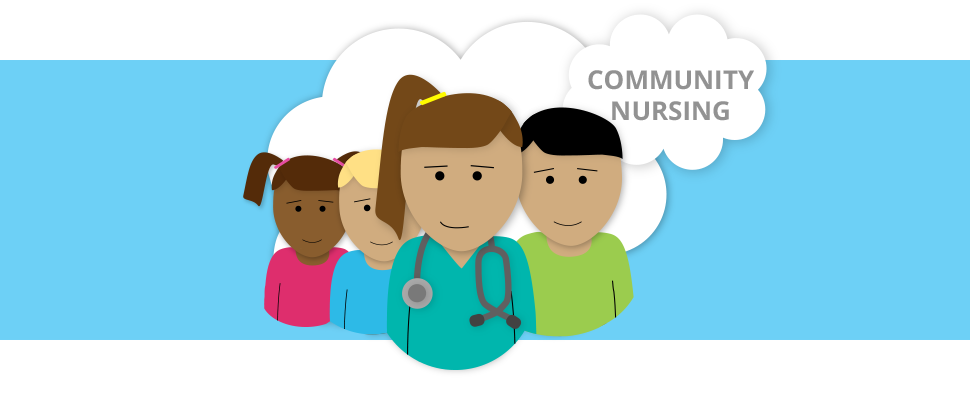
Community Nursing
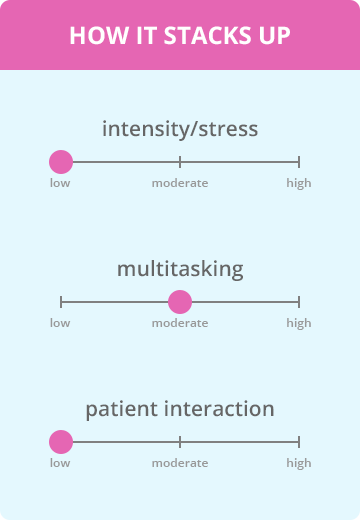 This field of nursing is unique in that the nurse will be caring for entire populations of patients. The role of the Public Health Nurse is to improve health in the community, enhance public safety, provide education, and increase access to medical care. These nurses work to identify public health issues, design interventions such as screenings, communicate with the legislature, and educate people in the community about available services. These nurses must be comfortable interacting with large groups and be open-minded about cultural differences. Bilingual nurses are in high demand, according to the Chicago Tribune. Some travel may be involved.
This field of nursing is unique in that the nurse will be caring for entire populations of patients. The role of the Public Health Nurse is to improve health in the community, enhance public safety, provide education, and increase access to medical care. These nurses work to identify public health issues, design interventions such as screenings, communicate with the legislature, and educate people in the community about available services. These nurses must be comfortable interacting with large groups and be open-minded about cultural differences. Bilingual nurses are in high demand, according to the Chicago Tribune. Some travel may be involved.
Stress Level: Moderate to High. Public Health Nurses are behind the scenes, involving much more planning and researching than direct care. They have relatively infrequent patient interaction, and usually with patients stable enough to be out in the community. However, these nurses work very hard at improving the health of the entire community through an advocacy role and the stress of pushing for change and keeping abreast of current events can be difficult.
Multitasking Required: Moderate. Duties can include working with the community, developing a budget, research, and planning programs such as educational sessions at schools, community groups, senior centers, and other local groups.
Patient Interaction: Low. The Public Health Nurse does see some patients but spends much more time designing programs for the community and advocating on behalf of the community to authorities.
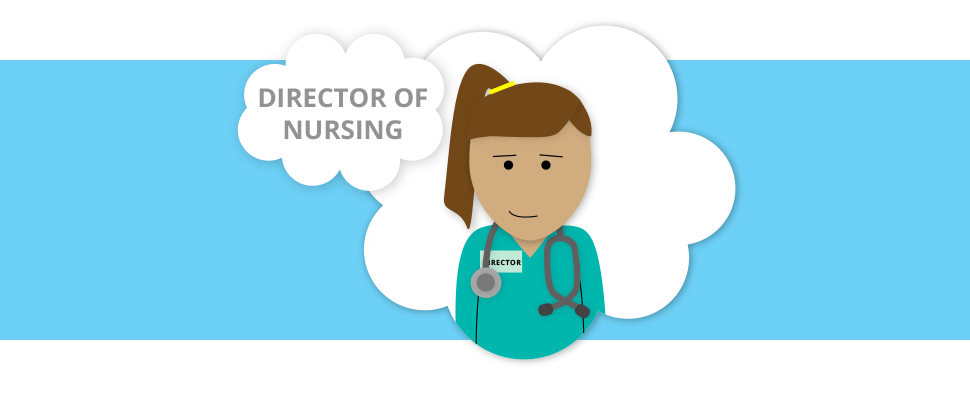
Director of Nursing
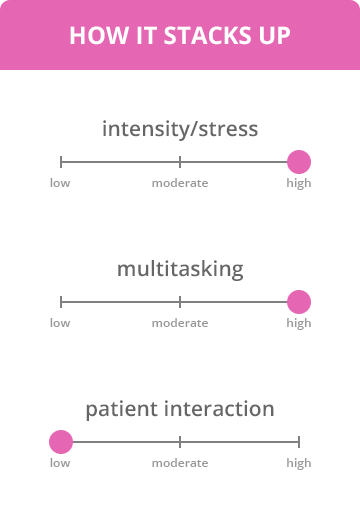 The Director of Nursing is an administrative position requiring nursing experience and some specialized training. This nurse will be a lifeline between floor nurses, patients, and physicians, communicating the wishes and needs of each party. Accident prevention, staffing, monitoring staff conduct, and keeping track of nursing licenses and skills to ensure they remain current are some of the many duties that fall under the jurisdiction of a Director of Nursing. These nurses can also be called upon as a witness if there is a trial regarding an incident at their facility. The Director of Nursing must be mature, experienced and professional.
The Director of Nursing is an administrative position requiring nursing experience and some specialized training. This nurse will be a lifeline between floor nurses, patients, and physicians, communicating the wishes and needs of each party. Accident prevention, staffing, monitoring staff conduct, and keeping track of nursing licenses and skills to ensure they remain current are some of the many duties that fall under the jurisdiction of a Director of Nursing. These nurses can also be called upon as a witness if there is a trial regarding an incident at their facility. The Director of Nursing must be mature, experienced and professional.
Stress Level: High. Highly stressful situations can arise when staffing and dealing with a potential conflict.
Multitasking Required: High. The Director of Nursing must be aware of what is going on at their facility, with both patients and nurses. Hiring, communicating with every person in the facility, and ensuring that policies are being adhered to are just a few of the duties this nurse will be responsible for.
Patient Interaction: Low. The Director of Nursing will establish a relationship with patients but will not provide much in the way of routine care.
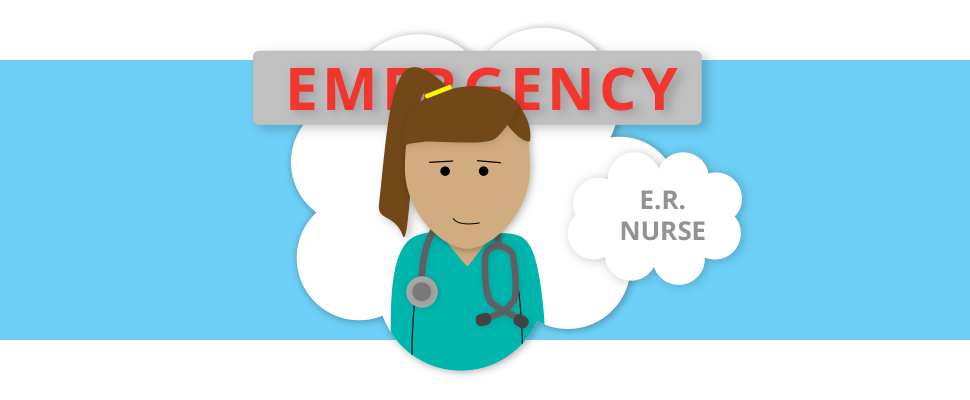
Emergency Room Nurse
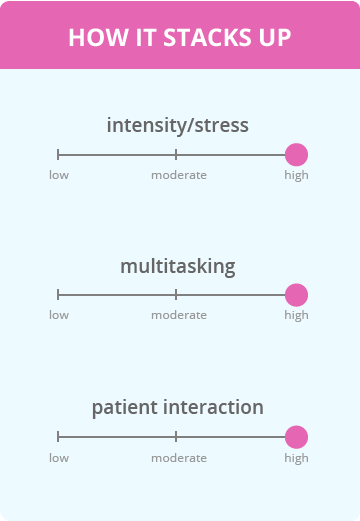 This high-intensity setting is the perfect place for nurses who are energetic, confident, and love excitement. This nurse will provide care to patients from all walks of life, with every condition imaginable. In one shift, you may resuscitate a victim of a motor vehicle accident, and then go assist in an emergency delivery. This field offers the opportunity to practice a variety of nursing skills and observe a vast array of medical conditions, resulting in invaluable experience. An ER nurse must be able to quickly shift gears mentally, work rapidly, have good decision-making skills, and excellent interpersonal skills.
This high-intensity setting is the perfect place for nurses who are energetic, confident, and love excitement. This nurse will provide care to patients from all walks of life, with every condition imaginable. In one shift, you may resuscitate a victim of a motor vehicle accident, and then go assist in an emergency delivery. This field offers the opportunity to practice a variety of nursing skills and observe a vast array of medical conditions, resulting in invaluable experience. An ER nurse must be able to quickly shift gears mentally, work rapidly, have good decision-making skills, and excellent interpersonal skills.
Stress Level: High. The emergency room staff are on the front lines, receiving patients who are severely ill or critically injured. The ER can be quiet one moment, and then chaotic the next. Clear thinking can be a challenge in some of the situations an ER nurse faces.
Multitasking Required: High. An ER nurse has many duties that can change quickly and frequently. The ability to triage is essential.
Patient Interaction: High. The ER nurse will see a high volume of patients, though most patients will stay in the ER relatively briefly.
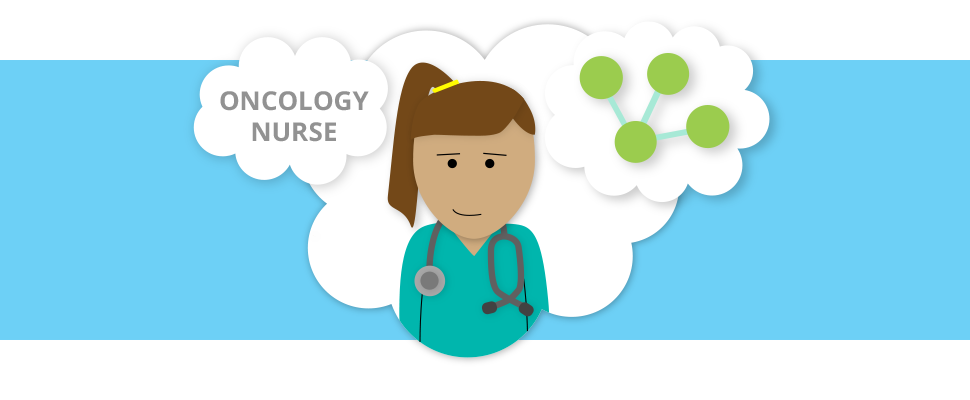
Oncology Nurse
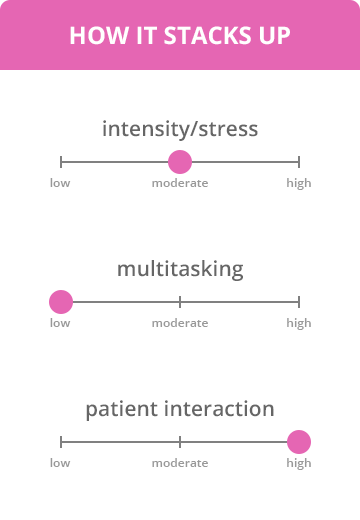 The Oncology Nurse cares for patients who have a cancer diagnosis. These nurses practice in a variety of settings. Administering chemotherapy, providing education, and managing signs and symptoms from illness or treatment make up a large part of an Oncology Nurse’s duties. Cancer and its treatment can be very painful, and the patient may also be dealing with the awareness that their lives hang in the balance. The Oncology Nurse will come face-to-face with death and grief on a daily basis. This field requires the nurse to have strong empathy and compassion. A career in oncology can be very rewarding, and at the same time incredibly sad.
The Oncology Nurse cares for patients who have a cancer diagnosis. These nurses practice in a variety of settings. Administering chemotherapy, providing education, and managing signs and symptoms from illness or treatment make up a large part of an Oncology Nurse’s duties. Cancer and its treatment can be very painful, and the patient may also be dealing with the awareness that their lives hang in the balance. The Oncology Nurse will come face-to-face with death and grief on a daily basis. This field requires the nurse to have strong empathy and compassion. A career in oncology can be very rewarding, and at the same time incredibly sad.
Stress Level: Moderate. Patients and their families can have many demands or may express anger as a side effect of fear and grief. As a result, this specialty can be emotionally stressful for the nurse.
Multitasking Required: Low, with the exception of lots of charting and documentation.
Patient Interaction: High. You will have to build a relationship with your patients and have to be prepared to give people the best, or possibly worst, news of their lives. It is very important that oncology nurses have a good bedside manner.

